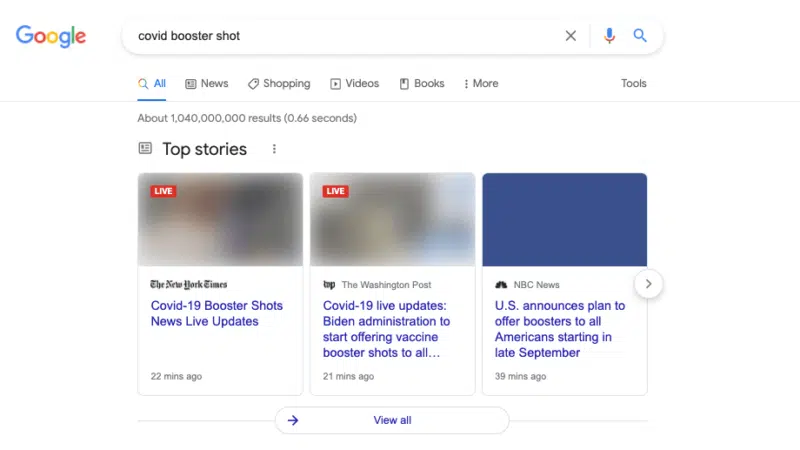‘It depends’ doesn’t have to be the answer if you ask the right questions; Thursday’s daily brief
Plus, blank images in Top stories and new features in the YouTube results page.
Search Engine Land’s daily brief features daily insights, news, tips, and essential bits of wisdom for today’s search marketer. If you would like to read this before the rest of the internet does, sign up here to get it delivered to your inbox daily.
Good morning, Marketers, aren’t you tired of hearing “it depends?”
After moderating so many Overtime Q&A sessions for SMX, I’ve noticed that many professionals formulate their questions something like this: relevant background information, goal, “What should I do?”
“It depends” is the preface I hear most often from our expert speakers. That’s because, while they do possess more strategic knowledge that could benefit you, they aren’t totally familiar with your situation (and that’s due to the short nature of Q&A sessions — Twitter conversations are pretty much the same, too).
Instead of having your peers spitball a few ideas (a fraction of which you’ll reject because you weren’t able to give a comprehensive overview of your predicament), I suggest that we rethink how we ask for help: Ask for what considerations you should take into account as you plan your strategy. This will help you think more critically about your business’ overall goals, how marketing fits into it and the role you, as a search professional, play when it comes to making it all work together.
George Nguyen,
Editor
Top stories images not loading in Google Search

Numerous reports of images not loading in Google’s Top stories carousel began surfacing on Twitter yesterday morning. We were able to replicate the issue (shown above) and the carousel shows either blank or blurred featured images, but some of the reports we’ve seen include screenshots of the carousel in which one or two of the images did successfully load. Google has confirmed that it’s a bug and is working on a fix but has not provided a timeline.
Why we care. A blurred featured image may negatively affect your clickthrough rate, so make sure to annotate your reports to reflect this oddity. In search results where just one or two images loaded successfully, the story (or stories) that didn’t load properly may receive fewer clicks. And, since the Top stories carousel is an important source of visibility and traffic for some publishers, this could also impact advertising revenue and other marketing opportunities that depend on getting a user onto your site if the bug goes unresolved for an extended period. Fortunately, Google is already working on it — we’ll continue to provide updates as they come in.
New ways to show up when people search on YouTube

YouTube this week made two big changes to how search works on the video platform:
- Timestamps come to video previews: Previously on desktop only, if you hover your mouse over a video, it would play a short preview snippet of the video. This preview capability is now rolling out to mobile. Plus, videos with timestamps will now have chapters available in the search preview.
- Auto-translating captions: Along with new preview options, YouTube will begin translating English subtitles to multiple languages (and eventually roll this out to captions in other languages, too).
Why we care. If you want your videos to stand out in YouTube search, adding timestamps will now be critical. The new translation option gives your videos the opportunity to show up for an even wider global audience than before.
It’s all about transparency
Red alert. “What red flags should companies be aware of when choosing an SEO agency?” asked Kim Doughty, and SEO Twitter is responding. It’s worth checking out just to ensure your own agency isn’t accidentally turning off businesses with its messaging. Our own Director of Search Content Carolyn Lyden advises that businesses steer clear of agencies that make guarantees (“Your site will rank for these keywords in X days!”), those that don’t give you admin access to your own analytics and agencies that use fine print to take ownership over your online properties/listings.
“Paid for by” label on political ads. Google is now placing “Paid for by” labels on some political ads. This transparency feature enables users to learn more about who is paying for the ad and even lets them see details such as how much the advertiser has spent. Tip of the hat to Valentin Pletzer for sharing this.
What if the secret sauce wasn’t a secret? “If Google actually gave you a detailed breakdown of exactly how their algorithm works to rank websites, don’t you think the #SEO industry would become a boring industry to work in?” Mark Preston asked. The responses run the gamut from “SEO would become boring” to deeper insights about how companies might shift their emphasis from paid to organic.
Sydney court orders a scorned patient to pay $450,000 over unjust negative reviews and content that damaged a surgeon’s reputation
As those who run a local business may already know, negative reviews don’t even have to come from customers — they can come from people who simply attempted to engage with your business. That’s what happened to Dr. Warwick Nettle, a Sydney-based surgeon who declined a patient after consulting with her former surgeon, who cautioned him about operating on her.
“A federal court judge on Wednesday said the effect of the false posts caused ‘extreme’ damage to both the surgeon’s emotional and mental state and his prior ‘impeccable’ reputation,” The Guardian published. “His five-star Google rating dropped to 3.5 stars after the first two posts were published.”
The court fined Catherine Cruse, the scorned patient, $450,000. Unfortunately for Dr. Nettle, Cruse seems to have disappeared — she filed no defense and appeared at no hearings, despite her prolific online smear campaign that spanned eight months and various forms of content, including reviews and defamatory posts on online reputation sites.
The extent of the online abuse here is far-reaching: “A since-removed post on a third website included images falsely claiming to be results of botched surgeries by Nettle. The post also featured headshots of the surgeon with the phrases ‘the devil himself’, ‘inhumane medical care’, ‘abuse of power’ and ‘compulsive liar’ superimposed on them,” the story reads.
In the search industry, we typically discuss the cost of fake reviews (and other content that serves a similar purpose) as harming both businesses and consumers, which downplays the damage because it comes off as an abstraction. In this instance, a Sydney court has quantified the harm, and although Dr. Nettle may have a hard time getting what he’s owed, this can be seen as something of a precedent for similar cases. It also highlights the fundamental problem with online reputation sites that extort people and businesses to remove negative content about them.
Opinions expressed in this article are those of the guest author and not necessarily Search Engine Land. Staff authors are listed here.
Related stories